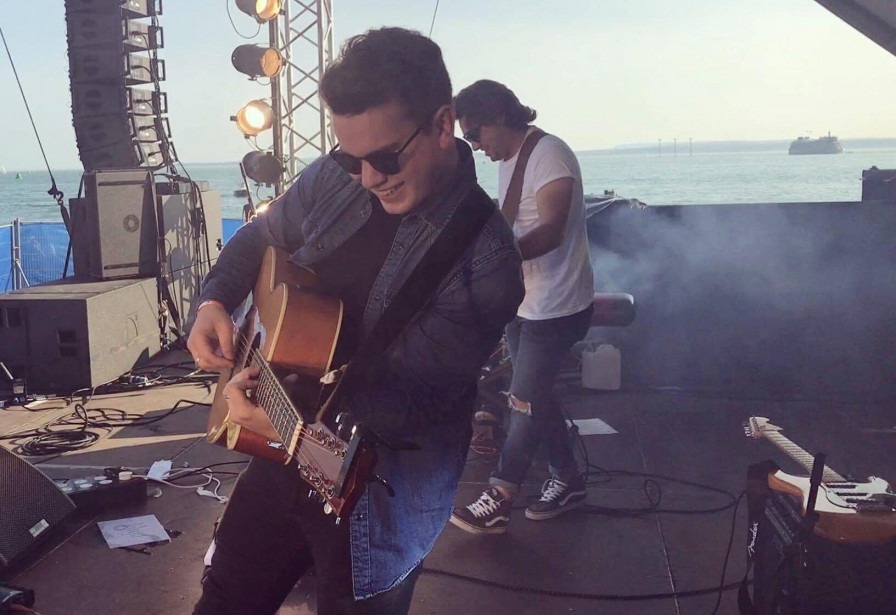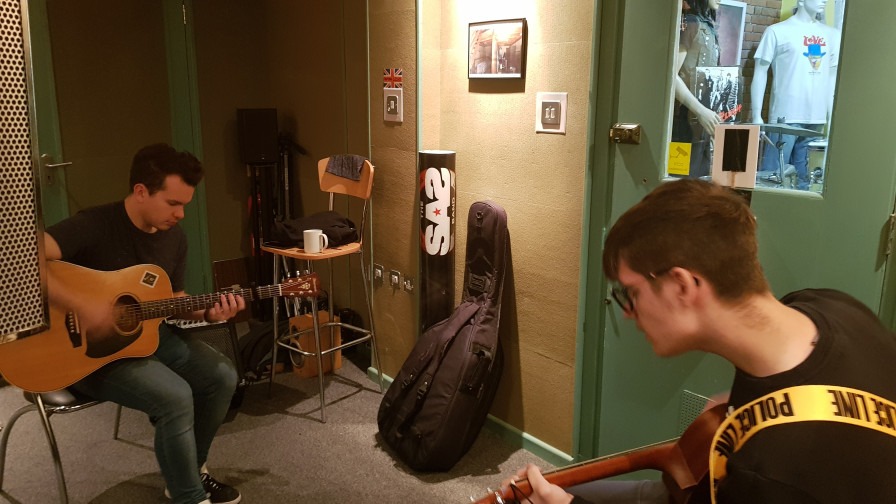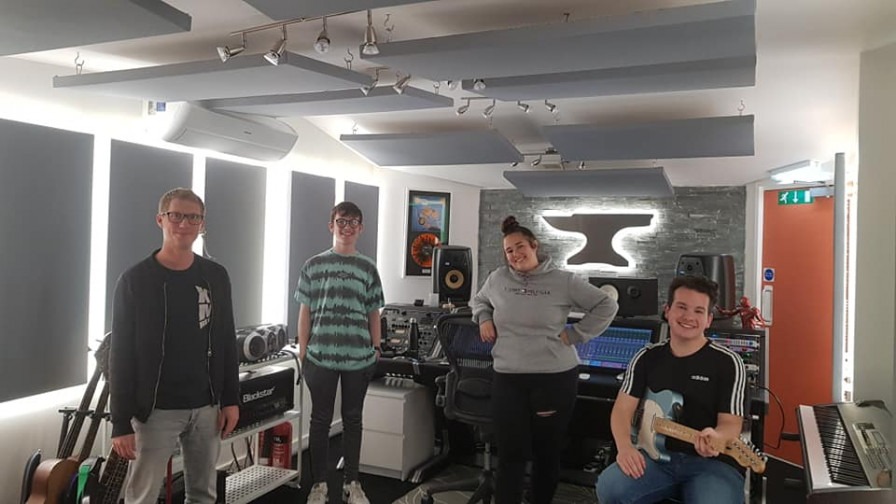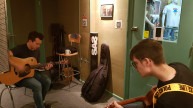UVG Mentoring Through Music Case Study - Marley

Portsmouth based singer-songwriter Marley Blandford has been releasing original music for a number of years and has performed at festivals and venues across the south coast. He has been a keen supporter of The UVG since performing at one of their open rehearsals in 2015 and since then has appeared as a guest artist and accompanist at many of the charity’s shows. We were therefore delighted when Marley agreed to take on the role of music mentor. This was a new venture for him (made even more unique with the added challenge of remote delivery) and was slightly outside of his comfort zone. At the end of the process we asked him to reflect on his experiences and here he gives a thoughtful and insightful look into the role.
How confident did you feel as a mentor at the start of the process?
Initially, I felt reluctant to even say yes because the thought of taking on the role as a "mentor" felt like it was beyond my capabilities. I've never felt that I could really pass on any information that would be of any benefit to anybody else. Maybe it was more of a confidence thing that anything else. I decided that I wanted to take on something different so I said yes. Nervous was the main feeling, as well as feeling like I may have jumped in the deep end to be suddenly talking 1-to-1 to a younger person about writing. Even though I had spoken to my mentee on previous occasions, it still felt like I shouldn't be up on a 'pedestal' but I wanted to overcome these initial feelings.
What, if any, were your concerns?
Due to an initial lack of self confidence in teaching my main concerns were that I would have felt awkward talking to and attempting to guide my mentee. I also feared that my mentee may have been very reticent when it came to deciding lyrics and ideas, leading me to have to strongly lead the project. I must add that this was soon pushed aside though after the first writing session took place and I realised that (after some gentle nudging) my mentee was able to start coming through with some lyrical ideas.
What did you feel your strengths were?
I felt strongest in my ability to see when my mentee was starting to struggle with words or a melody and come in with a small idea to help them along, at which point they would normally say whether they like it or not. If it was the latter, they would then come through with a slightly altered version of what I had given. It felt great to see their creative side working and I definitely thrived off of seeing them come up with new ideas, especially when so many of them fitted so well into the song. I also felt confident in my ability to give advice and tips on certain problems my mentee was facing with song writing and their confidence when giving lyric or melody ideas. It felt like I knew what I could advise, having worked through these problems myself and come out the other side in the past.
What area/s did you feel you had to work on as a Mentor?
I believe that my weakest area was communication in general. I feel that I could work out a better way of communicating with mentees in the future. I found it a little difficult to find a new way of talking which would be between ‘teacher’, ‘older person’ and ‘friend’, as well as only coming across as friendly rather than me trying to become a friend. I felt like I learnt a subtle way of ensuring this boundary is kept, while also being as approachable and friendly as possible. However, I do struggle a little bit with communication in general at times, so I suppose this was only natural to happen when I'm placed into a role that I've not filled before.
What surprised you?
It was a very nice surprise to realise how quickly I felt relaxed during the first writing session. I realised that I too was learning something through this process, so I found it easy to sit back and enjoy the process while working with my mentee. I found all the writing sessions a lot easier than I thought I would once I felt more confident in my ability to give any advice and tips that were needed. I also spoke with the UVG Director about how my mentee had struggled with lyrics and melody ideas in the past, so I feared that it may be quite a challenge to get some ideas flowing with him. This was all brushed aside once we started writing and they came through straight away with a chord progression for the verse, and once I had given a small idea for a melody and the first lines, started coming through with lyrical ideas to finish the verse. It felt like a 50/50 effort into writing, instead of what I was expecting to be more like 80/20.
Please give one example of something that you have learnt about...
The Process:
I soon realised that it's a careful balance of helping push the mentee to form their own ideas for the song, but not totally giving away a whole song. Leaving room for them to add what they feel was important. I was giving out unfinished lyrical and melody ideas, and then stopping & playing around the chords, indirectly leaving space to wait for the mentee to come through with something of their own. This seemed to work nicely for how we worked, giving them time to process the song and think of ideas, but without putting any strong pressure on them to come up with anything on the spot.
Yourself:
I learnt that I was more able to teach a bit better than I thought I could. I just had to bite the bullet and try my best. Once I realised that my advice and guidance would be taken on and appreciated, I felt that I could let my guard down a bit and say what I felt needed to be said.
Reflecting on your experience working with your Mentee, what advice would you give a young musician starting out writing their own material?
I would advise that it does feel tricky to everybody at first and that to not feel discouraged to try again when you're unable to come up with something after the first 10 or 20 minutes or trying, it's something that almost everybody struggles with when they first start. I found a way around this by writing about having writer's block, feeling the struggle and frustration, then that gets the creative juices flowing. After you've managed to get a line or two out, focus that creative energy on another topic, something you feel more happy to write about.
I'd also advise not to feel too shy about sharing lyrics, even if it's from the top of your head over a melody, half singing gibberish, or not singing at all. Hearing ideas out loud can really help you form a melody and some lyrics to fit the said melody. So many writers I've worked with in the past do exactly this, myself included, no-one judges at all.
Reflecting on your experience working on the project, what advice would you give a musician who is interested in becoming a music mentor?
I would firstly say go for it, 100%. If it doesn't work out, then you know you've tried it out, and that's the only worst case scenario. I'm SO happy that I did push myself out of my comfort zone because it was a learning curve for me too, which concluded with me feeling so much more confident in my ability to mentor and teach. I would advise that you do try and leave room for the mentee to give their own ideas and don't rush into writing the song for them by trying to finish that verse, etc. It would have been easy to keep giving ideas, so I had to ensure that I stopped at times and gave some time to my mentee to give their thoughts and ideas into the song.




